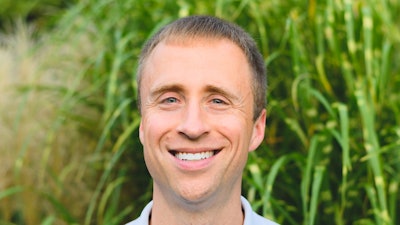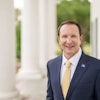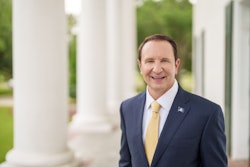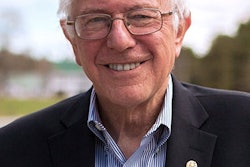As the U.S. veers into another major election year, some higher education scholars predict that issues related to the ivory tower will inevitably take center stage.
Timely issues such as student debt and the current onslaught against various progressive social and cultural ideals — matters of diversity, equity, and inclusion (DEI), race/ethnicity, and identity, among others — will be topics of discussion for President Joe Biden, who is likely to have another faceoff with the presumptive Republican nominee, former President Donald J. Trump.
Student debt
 Dr. Robert Kelchen
Dr. Robert Kelchen
Biden might look to take credit for whatever forgiveness efforts he has been able to push through and explain that the major shortcomings he’s faced on that front are a result of a failure by the Republicans to act, says Dr. Andra Gillespie, an associate professor of political science at Emory University.
Ever since the Supreme Court struck down the Biden administration’s debt forgiveness plan in 2023 — a plan that would have canceled up to $20,000 in loans for borrowers — Biden and officials at the U.S. Department of Education have sought alternative avenues to bring about debt relief.
One such effort, the SAVE plan — a new and adjusted income-driven repayment (IDR) plan that bases monthly payments on borrowers’ income and family size — was launched in August 2023 as a replacement to the previous Revised Pay As You Earn (REPAYE) plan. By bumping up income exemption amounts so that less of a person’s income is considered discretionary, borrowers face smaller or even $0 monthly payments. The plan also seeks to expedite debt cancellation for smaller borrowers who are enrolled. As of Jan. 11, 6.9 million borrowers are enrolled in the SAVE plan, touted by the Department of Education (ED) as “the administration’s most affordable repayment plan.”
The Biden-Harris administration’s efforts have also resulted in billions of dollars in additional relief as ED works to fix and adjust the loan system’s past errors in tracking forgiveness progress for those in IDR and Public Service Loan Forgiveness. The administration is also pursuing potential relief through negotiated rulemaking discussions with various different student debt stakeholders, including state officials, higher ed leaders, civil rights groups, military servicemembers, and borrowers. Originally planned for three sessions in late 2023 with these non-federal constituencies, ED planned to hold more in February.
Under Biden and Harris, the government has approved forgiveness for $136.6 billion in loans for more than 3.7 million Americans as of January, according to ED.
“The Biden administration would like to highlight what they’ve done for student loan forgiveness, which has been considerable, even with the Supreme Court shooting down their biggest effort,” says Dr. Robert Kelchen, head of the Department of Educational Leadership and Policy Studies at The University of Tennessee, Knoxville.
“It may play well in a general election, but it’s not exactly something that makes the progressive base happy because they don’t think that Biden went far enough. There’s a sizable contingent of young progressives that want universal loan cancellation.”
 Dr. Ann Marcus
Dr. Ann Marcus
On the other hand, Dr. Ann Marcus, director of the Steinhardt Institute of Higher Education Policy at New York University, is unsure, saying student debt was a divisive issue that was also “hard to follow.” She adds that, although debt relief may be received well by those benefitting from it, she is uncertain whether it is a popular issue that still was at the front of people’s minds.
Tangentially related is the Free Application for Federal Student Aid (FAFSA) — and ED’s ongoing delays and complications with it this college application cycle — which is not exactly a “sexy” topic of discussion, Marcus says.
“I can’t imagine candidates wanting to bring that up because, first of all, they would have to understand it and it’s not easy to understand,” she says. “And two, everybody would want FAFSA to work, but that’s not really a sexy issue, trying to say the government should work properly.”
Republicans are generally more unified in their stance in opposition of mass student loan forgiveness, Kelchen says. But they have also pivoted to discussing social and cultural issues around diversity, equity, and inclusion (DEI), free speech on college campuses, and “wokeism” — topics that he says he thinks have since overshadowed student debt.
DEI and academia
Efforts around DEI and the institution of higher education as a whole may be key targets for Republican candidates and politicians, scholars told Diverse.
Over time, those on the political Right, particularly in places like Florida and Texas, have taken aim at practices they deem ‘woke’ through policy and condemnation. One attack in recent memory was the banning of diversity offices at state colleges and universities in Texas.
Tillery, for one, expects more bans on DEI policies and more attempts to ban books and curriculum that have to do with racial and ethnic studies and LGBTQ+ topics. He expects such attacks to be met with legal challenges from groups like the ACLU and the NAACP.
According to a November 2023 report from PEN America, more than 100 new educational gag orders to limit teaching about certain topics were introduced in 2023, with prominent targets being gender identity, sexual orientation, and race.
Tillery says he has found himself shocked by how “feeble” the Democratic Party’s response to these attacks have been, despite his polling indicating that DEI programs are very popular among all Americans, especially those in the Democratic voter base.
“Their inability to make it a campaign issue just shows more incompetence, frankly, at the level of messaging that seems ripe for the picking,” Tillery says.
 Dr. Andra Gillespie
Dr. Andra Gillespie
“Certain things that are education, including higher education-adjacent, are going to be invoked during the presidential campaign,” Gillespie says. “For instance, ‘woke’ is going to be a trope that’s used. Certainly, that’s been deployed in K-12 education, but we’ve also seen that being deployed against higher education.
“So I expect [Donald Trump] – assuming he’s the nominee – is still going to talk about woke ideology and the ‘woke Left’ and all those kinds of things. And higher ed is implicated in that, in part because of the idea that a lot of these ideas have originated on college campuses amongst scholars, the social sciences, law, and the humanities.”
Although trying to change the education landscape may not be as prominent of a campaign talking point with Trump than it would have been with anti-DEI crusader Florida Gov. Ron DeSantis – who dropped out of the Republican primary in late January — that’s not to say the topic won’t come up, especially if DeSantis or rising Republican Congresswoman Elise Stefanik of New York is tapped as the vice presidential nominee, Gillespie says.
DeSantis in particular has ample experience dismantling and combating higher education in his state, with his takeover of the New College of Florida in 2023, where he installed a conservative-leaning leadership structure to reshape the school from the inside.
Meanwhile, Stefanik’s efforts gained major attention a couple months prior. Her December interrogation of the presidents of several prominent institutions about Israel-Palestine sentiments on college campuses went viral and resulted in the resignation of University of Pennsylvania President M. Elizabeth Magill and Harvard University President Dr. Claudine Gay. Gay was Harvard’s first Black leader.
“I think that people like [Republican Congresswoman Virginia Foxx of North Carolina] and Elise Stefanik believe that those are winning issues for the Republicans, so I expect more investigations and more spotlight on that issue,” Tillery says. “I think they’ll just try to keep [on] the antisemitism horse and bring more elite college presidents before that committee and try to box them in to statements that they can then use to try to take them down or generate quotes that will be to their advantage politically. I see more of that coming.”
Tillery says he expects Republicans to continue their attack on academic freedom and will double down on their claims that the ivory tower gives rise to indoctrination and “woke culture.”
“There’s this larger discussion that’s actually been going on for years now about how we value expertise,” Gillespie says. “When Donald Trump is talking about draining the swamp – as he has his entire political career – he’s talking about taking power away from traditional elites. Higher education is a bastion of traditional elitism.”
Topics related to rising tensions on college campuses and the December congressional hearing – free speech, antisemitism, and Islamophobia – will be mentioned by Republicans in the context of trying to challenge the legitimacy of higher ed as an institution, according to Gillespie. Higher ed may not be safe at the state level either, when governors, state senators, and representatives are vying for re-election. Even more so than in the national race, state elections have the potential to bring up matters of what students should be taught.
“Governors have lots of authority in states that have statewide university systems and regent systems. It’s the governor who’s making those appointments often,” she says. “And so, higher education can certainly come up as an issue of concern and an issue on which they want to take a stand and make certain types of campaign promises.”
Despite strong sentiments from the right against DEI, the public may not give it much thought, Marcus notes. After all, even DeSantis, whose battle against “woke” was an undeniable characteristic, ended his presidential bid.
According to The New York Times, just 24% of national Republican voters said they would vote for a hypothetical Republican candidate focused on defeating “woke” ideology instead of one focused on “restoring law and order in our streets and at the border.”
“You could have the DEI attack as a sexy issue if you’re maybe in a state like Texas or where you think the population is going to resonate to that, that you’ll eliminate all the DEI offices, clean up the curriculum,” Marcus says. “But I don’t know. I think DeSantis not doing well as a candidate was a sign that maybe people are kind of tired of that.
“They may agree with some of it, but are they going to see that as a compelling issue?”
Average voters may not even view higher ed as a centrally important campaign topic and may not care about scrutinizing colleges and universities in regard to issues such as free speech, Islamophobia, antisemitism, or plagiarism, Marcus suggests. As it stands now, higher ed is a sensitive-but-controversial thing to bring up, she says.
There are also growing sentiments among the general public about the overall value of a college education.
“I honestly don’t know,” she says. “Right now, I think a lot of candidates are going to want to stay away from higher ed, with all the controversies about antisemitism, Palestinians, free speech, and people getting cancelled and fired. I would just personally stay away from it.”


















